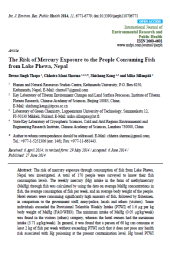The Risk of Mercury Exposure to the People Consuming Fish from Lake Phewa, Nepal
Summary
This research article published by the International Journal of Environmental Research and Public Health is a risk assessment study report. Exposure to toxic mercury (Hg) from consuming aquatic resources, particularly fish, is a global health concern linked to human activities. Anthropogenic emissions of mercury contribute to the formation of methylmercury (MeHg) in fish, a highly neurotoxic form. This MeHg accumulates through food chains, leading to higher concentrations in top predator fish. People, especially women, children, and fetuses, are vulnerable to Hg's harmful effects on the nervous system. Despite global attention, research on Hg pollution is lacking in Himalayan areas. The study focuses on Hg exposure in individuals living near Nepal's Lake Phewa, a popular tourist area where fish consumption is prevalent.
Categories:
Case Studies
Writer:
Devna Singh Thapa, Chhatra Mani Sharma, Shichang Kang and Mika Sillanpää
Link Source:
https://doi.org/10.3390/ijerph110706771
Publisher:
International Journal of Environmental Research and Public Health
Published Year:
2014
